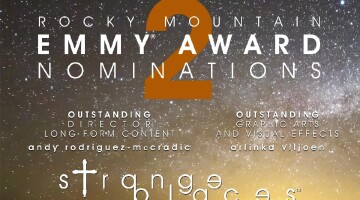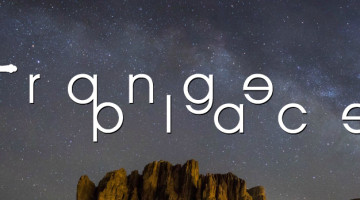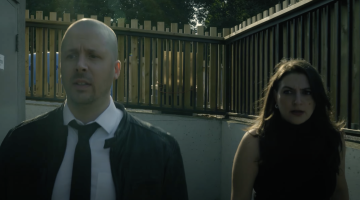Some of the most memorable films, TV shows and web series have done more than simply entertain viewers. They’ve made us consider just what it means to be part of a rapidly changing society, while also shining a light on the major conflicts and problems that continue to affect us on a daily basis.
The new sci-fi series LUSA accomplishes both goals while also bringing viewers an impressive visual style that truly demonstrates the possibilities of producing quality content on a limited budget. The series launched this past April with six character video blogs (or “vlogs”), later followed by six full episodes – all of which are now on its official Youtube page.
The series revolves around a young woman named Lusa, played by Christina Wren, (MAN OF STEEL, BATMAN V. SUPERMAN), who co-created the series with husband Demetrius Wren.
Living on the oppressive alien planet of Deata, Lusa hacks into the broadcast signals of its heavily propagandized state-run TV network as she attempts to warn Deata’s population of the dangers they find themselves in, while giving them the knowledge they need to help rise up against its tyrannical government.
 As a result of her actions, she’s been forced out of Deata’s capital city, Dunkar City. Having been banished to a desolate, alien populated land, Lusa fights to survive as she plots an uprising against the planet’s brutal rule.
As a result of her actions, she’s been forced out of Deata’s capital city, Dunkar City. Having been banished to a desolate, alien populated land, Lusa fights to survive as she plots an uprising against the planet’s brutal rule.
While having to fight deadly alien beings, Lusa is also discovered by a man named Tunko (Juan Cardenas, SCANDAL), who has managed to survive on the otherwise deserted landscape she now finds herself in.
Adding to Lusa’s struggle is the fact that while on Deata, she also gave birth to a baby – one that happens to be fathered by Dunkar City’s most powerful corporate titan, Bendor (played by Peter Porte, BABY DADDY, THE YOUNG AND THE RESTLESS). With the battle lines having been drawn, Lusa and Tunko must fight for their own survival, as well as that of the enslaved citizens of Deata itself.
Both tremendous fans of science fiction, especially that which also provides pointed social commentary through its stories, the Wrens began discussing what would become the concept for LUSA during a road trip through Arizona’s vast desert. While primarily working on projects just to make ends meet, they had a desire to make a project that would be both challenging and rewarding.
However, the concept for what would become one young woman’s quest to fight back against the cruel, dictatorial power of a corrupt government came not just out of the Wrens’ ambition to produce content that would help them improve as filmmakers, but out of the all too real battles of people all over the world who fight valiantly for change amid war, violence and death.
 “At the time, there was a lot on the news radio about Syria and different political struggles where it is difficult to pick a side. The world is so complex that the simplicity of the good versus evil dynamic starts to feel false. More like a series of political sides, really,” Demetrius Wren remembers.
“At the time, there was a lot on the news radio about Syria and different political struggles where it is difficult to pick a side. The world is so complex that the simplicity of the good versus evil dynamic starts to feel false. More like a series of political sides, really,” Demetrius Wren remembers.
“So we (he and Christina) started writing this web series. We decided to go with science fiction as a way to talk about these issues with some standoff.”
Along with its distinctive perspective on the true consequences of global war and political corruption, LUSA is also unique because of its overall production approach.
While some tend to view independently produced, low budget web series as being cheap and amateurish, that perception is rapidly changing thanks to shows like LUSA; series that combine arresting visuals and stunning sound with compelling acting and writing.
Most of all, Demetrius adds, he and Christina wanted to make LUSA stand out for one very important reason: “We also wanted to make a series that went after our own dreams of having a strong female protagonist, (and) let’s even up the stakes – a strong female protagonist with a newborn baby strapped to her – fighting aliens and playing the role of the heroic yet reluctant leader of her people.”
Even more importantly, amid all the whiz-bang CGI effects and stylized visuals, the heart of LUSA is found in its characters and its story; one of survival and of hope in a turbulent world. “As far as the sci-fi genre goes, Christina made it a point to always aim for the heart,” he says. “Yes, we can have cool effects, awesome spaceships and crazy monsters, but Christina wanted to make sure that we kept the very real human elements to it.”
+Their decision to use Youtube as LUSA’s main hub for each episode also factored heavily into their decision to produce it as a web series. “It’s something that we wanted to do for a while and tried out a few times, but (we) never really had a story that we really cared about in that ‘once a week’ update sort of way,” he recalls. “You really have to be in love with a project to do that, especially when there is no money involved.”
 For the Wrens, the six first person character vlogs (featuring Christina as Lusa) would be the first steps they would take as producers towards fully developing the project itself.
For the Wrens, the six first person character vlogs (featuring Christina as Lusa) would be the first steps they would take as producers towards fully developing the project itself.
While they had ample experience working on documentary films and commercials for other producers, they also took time to refine and develop their production process for LUSA, while investigating the possibilities that Youtube and other resources provided for their series to grow.
“We started researching blogs, YouTube creator resources, Adwords techniques, etc. We released the vlogs first to get a hang of how this system worked so that by the time we get to the full episodes, we would be pretty confident in how to pull it off,” he says. “We just hope that when people watch it, they understand that it is a passion project by two people with a can-do attitude. But then, we hope they quickly get into the story and go from there.”
Finding the rest of LUSA’s cast was made easier thanks to an extensive portfolio of actors that the Wrens had on hand as a result of auditions for past projects. It also helped that some of the actors had prior connections through their experience studying the craft of acting alongside LUSA’s producers.
“I (Demetrius Wren) met Juan Cardenas (Tunko) while teaching an acting workshop in Florida at the Asolo conservatory there. Christina studied acting at NYU with Peter Porte (Bendor),” he says. The two have wanted to collaborate for some time on a project. Christina also taught a class with Columbia Graduate Kila Packett (who plays X in LUSA).”
Filmed over the course of several months, usually on weekends when the Wrens were free from their other work projects, both Demetrius and Christina Wren served as LUSA’s primary production team. With each episode having been shot on five separate days over that period, the advantages of working together as a small, yet mobile unit behind the camera were obvious.
 “It was pretty cool to work with a two-person crew mostly because we could try stuff and not worry about it if it didn’t work,” he says.
“It was pretty cool to work with a two-person crew mostly because we could try stuff and not worry about it if it didn’t work,” he says.
“There is always this feeling of not wanting to waste anyone’s time when you’re trying something new with a large crew. With just the two of us, we could go hand held and just have fun in the desert. If it worked, it worked. If it didn’t, well, it was still fun.”
Although the Wrens were committed to shooting each episode on a low budget, there was one instance that momentarily tested their dedication to that goal. “The most expensive part of the film was the permits to film in Joshua Tree National Park (site of the desert scenes),” he recalls. “They were very kind to us, however when they realized it was just myself, Christina, and one other actor, with a camera – they cut us a deal.”
The six introductory vlogs were also produced in a relatively simple, yet visually powerful fashion. “We shot the vlogs in our bedroom with a blue sheet we threw across the closet door,” he says. “We had this small Lowel Rifa light that we put right in front of the camera and Christina read from an iPad teleprompter. Very low-fi!”
 Each episode of LUSA was filmed on RED cameras, with several other portions of footage captured on the Canon 5D.
Each episode of LUSA was filmed on RED cameras, with several other portions of footage captured on the Canon 5D.
Along with Final Cut Pro X, which helped accelerate the tapeless upload process to Youtube, the Wrens had access to cutting edge editing and special effects software which would help them improve and perfect LUSA’s impressive visual aesthetic.
“A lot of the 3D animation resources (software, etc) also came as a piggyback from some of our client work,” he says. “We (Demetrius and Christina) would do a 3D motion graphic project for an advertising client that required a newer version of Modo and we’d update the software. And then the next draft of a LUSA episode had better 3D graphics.”
Those graphics developed gradually over the course of each episode. “For our 3D animation needs, we used a hybrid method. For non-organic stuff (space ships, etc,) I built them in Cinema 4D,” he adds. “We also relied heavily on Element 3D by video co-pilot. They have this future city kid that allowed me to build out some of the more complex cityscapes. We also did some kit bashing to create some of the droid type creatures.”
Those strange, dangerous creatures were designed by Dakotah West, who created them from a series of rough sketches that he and Demetrius would work from during the post-production process. West, who also happened to be highly knowledgeable in the dynamics of dinosaur characteristics and biology, made a strong contribution to LUSA’s visual look thanks to his expertise in both subjects, and his outstanding talent as an artist.
 “He (West) could look at the landscapes from the raw dailies that we shot in Joshua Tree and say, ‘okay, for a creature to live here, it would need these sorts of biological features,’ and then come back with drawings that fit. I (Demetrius Wren) later took these drawings into Modo and sculpted the creatures to match the creatures he created. We later brought that into Cinema 4D and After Effects to animate.”
“He (West) could look at the landscapes from the raw dailies that we shot in Joshua Tree and say, ‘okay, for a creature to live here, it would need these sorts of biological features,’ and then come back with drawings that fit. I (Demetrius Wren) later took these drawings into Modo and sculpted the creatures to match the creatures he created. We later brought that into Cinema 4D and After Effects to animate.”
While the Wrens hope to continue to expand their horizons as filmmakers, their main goal through LUSA is to bring viewers a compelling, entertaining sci-fi series that does more than just put viewers on the edge of their seats. They also seek to give viewers a chance to fully ponder the complex nature, politics, and overall meaning of their lives in today’s society.
“This show is about discovering your destiny and deciding whether or not you are in control of it. There is a moment in life when there are no good or bad guys. There are just individuals that speak to you and those that don’t,” Demetrius Wren says. Above all, he adds: “Make your own choices. We all have super powers. Try your best to use your super powers for good.”
(Note: Regarding closed-captioning, the Wrens say: “The first three episodes are closed captioned. We’ll have all of them done by the end of season one.”)
(Note #2: Several of Demetrius Wren’s responses were taken from a prior interview conducted by Cody Gallo on May 17th, 2015, before this article was written. This interview was made available as part of the press materials for LUSA.)
YOUTUBE: https://www.youtube.com/c/LusaSeries










No Comment